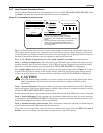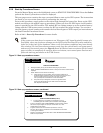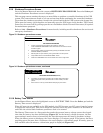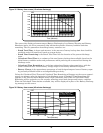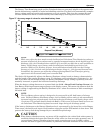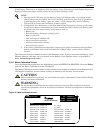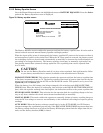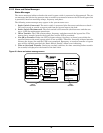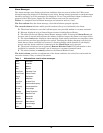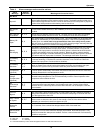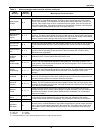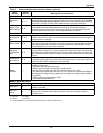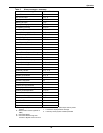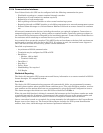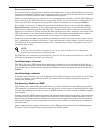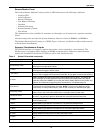
Operation
50
Alarm Messages
The alarm message area displays the alarm conditions that are present within the UPS system.
Alarm messages are displayed in flashing reverse video. During normal operation no alarm messages
should be present. Up to four messages are displayed. To see if any additional alarm conditions are
present in the UPS system, display the Present Status screen on the control panel.
Table 4 is a complete list of all alarm messages and corrective actions, if any.
The first column lists the alarm message, with related alarms grouped together.
The second column indicates which special functions (if any) are initiated by the alarm.
D - The alarm initiates an auto-dial call through a user-provided modem to a remote terminal.
E - Message displayed only on Status Report screens including Event History.
F - The alarm freezes the History Status Report memory buffer. Pressing the Alarm Reset pad
for more than 5 seconds will unfreeze the memory buffer as long as the alarm is no longer active.
L - The alarm latches the displayed alarm message. Some alarm conditions are temporary (tran-
sient) and may not last long enough to be noticed. Latching the display (keeping it on) lets you
know that an alarm condition has occurred. A latching display alarm remains on the display
screen until the alarm condition is removed and the Alarm Reset pad is pressed.
R - The alarm is displayed on an (optional) Remote Monitor Panel. This information is also
available for customer use through a set of contacts on a separate terminal board.
S - The alarm initiates a summary alarm at the Remote Monitor Panel.
The third column provides an explanation of the alarm condition, the critical bus status and the
corrective actions, if any, to remedy the alarm.
Table 3 Abbreviations used in alarm messages
Auto Automatic
Avail Available
Batt Battery
Byp Bypass
Cap Fuse Capacitor Fuse
Cont Power Control Power
Equip Equipment
H/W Hardware
Inv Fuse Inverter Fuse
OF/UF Over/Underfrequency
Ov-temp Overtemperature
O-volt Overvoltage
Ph Seq Phase Sequence
Rect Fuse Rectifier Fuse
Rexfer Retransfer
Shutdn Shutdown
Static Sw Static Switch
Un-volts Undervoltage
Xfer Transfer



